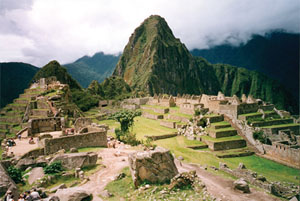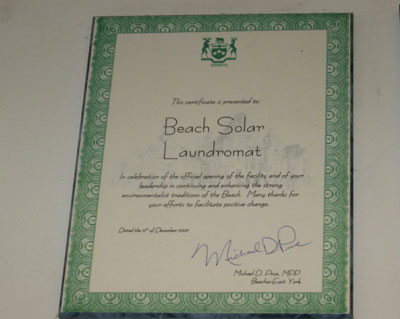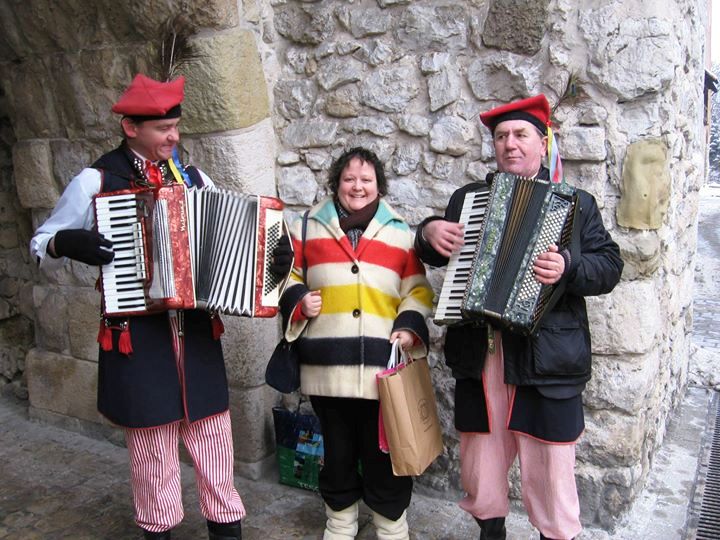Danielle Weiss is the Sustainable Travel Coordinator for G.A.P Adventures, Canada’s largest adventure travel company and winner of many distinguished entrepreneurial and travel industry awards. I am also happy to say that G.A.P is also the sponsor of our first travel story contest who has generously provided the top prize for our contest: an amazing adventure expedition cruise through the Amazon.
G.A.P Adventures is a very unique travel company that combines small group adventure tours with concepts of environmental sustainability and social conscience.
Danielle is also one of the main people behind the Planeterra Foundation, a non-profit organization that was developed by G.A.P Adventures as a way to give back to the people and places they visit on our tours. Danielle herself is an avid traveller and in her personal interview she shares her personal stories of how travel changed her life.
Danielle, working in an indigenous village in the Ecuadorian Andes
I had a chance to ask Danielle about “sustainable tourism” and what all of us can do to minimize our impact on the communities we come in touch with. Here are her insights:
1. Please tell us more about “Sustainable Tourism”, what is it?
I would define Sustainable Tourism as tourism that has minimal impact on the environment, respects local people and cultures, offers economic benefit to locally owned businesses and incorporates community-based ecotourism projects.
2. What does it mean to be a “Responsible Tour Operator”?
Being a Responsible tourism means being committed to offering low-impact tours that benefit traveller and host alike. G.A.P Adventures is an example of a company that prides itself on being a responsible operator. We work with local communities, businesses and individuals to develop sustainable tourism opportunities that help local economies while minimizing negative environmental and cultural impacts. We travel in small groups, use local transportation and stay in locally-owned accommodations.
Part of G.A.P’s operating philosophy is to respect the communities in which we operate. G.A.P does this by acting in a manner that is environmentally, socially and economically responsible. While our sustainable tourism policies are constantly evolving, our commitment to socially conscious, grassroots style travel has never changed. In recognition of our efforts in the area of social responsibility, G.A.P won the Ethics in Action Award. We are proud of our reputation, the work we do with local communities and the style of travel we offer to our passengers.
3. What are “Ecotourism Operator Standards”?
With the help of Conservation International, G.A.P Adventures developed a set of Ecotourism standards which act as a code-of-conduct to ensure that we act responsibly at all levels of the company. Every year these standards are re-examined and, where appropriate, targets are raised or new standards are added.

Young girl working in the Otavalo market, Ecuador
– Company-wide policies:
1 Use of local transportation
2 All G.A.P Adventures staff and partners are aware and knowledgeable of the Standards program.
3 Reduce, Reuse (and Recycle whenever possible).
4 Annual contribution to conservation and community development NGOs (non-governmental organizations).
– Marketing:
1 Promote Standards in all marketing campaigns.
2 Marketing materials: Brochure contains at least 20% post-consumer recycled paper. Newsletter to remain online.
– Tour Operation:
1 Visit at least one officially established protected area on each tour and provide information on such areas to our clients.
2 Provide employment and/or business opportunities to local people.
3 Suppliers are encouraged to improve their own environmental/social standards.
4 Maximum group size is 12 passengers on all G.A.P Tour Leader-led tours. G.A.P ensures that local operators and other travellers are aware of the benefits of conducting small-group tours.
5 No use of suppliers who support exploitative practices. For example, we don’t condone selling endangered species products, harming threatened habitats or prostitution.
– Tour Leaders:
1 Tour Leaders are fluent in English and Spanish.
2 Tour Leaders receive special training in low-impact travel and are selected based on their knowledge, commitment to and awareness of sustainable travel. Tour Leaders must possess First Aid and CPR certification upon being hired.
3 Tour leaders are encouraged to research eco-friendly operators, accommodation, and possible projects that can be incorporated into our tours.
– Accommodation:
1 All hotels have less than 40 rooms, except joining and departure points, which have less than 100. Otherwise, the best feasible option is employed. Best feasible option means that if there is an alternative that is a more responsible option in terms of the social and natural environment, this can be taken.
2 The majority of accommodation is locally owned.

Building a stove with a local family in the highlands of Peru
4. What makes travelling with G.A.P Adventures unique in the context of sustainable tourism?
Travelling responsibly as a passenger on a G.A.P Adventures tour results in a more enjoyable and authentic travel experience. We believe that tourism should be about interacting with other cultures, not exploiting them. This means travelling with local people on public buses rather than looking at them through the window of a private tour bus; and staying at a small, locally- owned guesthouse rather than a large, foreign-owned hotel. It also means travelling in small groups that are less intrusive and offer more opportunity for local interaction.
5. What does being a “Responsible Traveller” entail?
As a traveller, you can do a lot to help ensure that tourism in developing countries remains a positive experience for everyone. The following guidelines offer suggestions for low-impact and culturally sensitive travel:
– Stay on the trail
Straying from the trail while hiking can cause erosion and other environmentally harmful impacts.
– Respect the wildlife
Viewing animals from a safe distance is fine; touching, feeding, or cornering them is not.
– Respect endangered species
Do not buy products that exploit wildlife, aid in habitat destruction, or come from endangered species.
– Do not litter
This is one time when the old adage “When in Rome, do as the Romans” doesn’t apply. Even if you see a local person littering, set an example and dispose of your garbage appropriately.
– Reduce waste
Recycling is extremely limited or non-existent in most developing countries. Avoid products with excess packaging; opt for beverages in glass bottles as they tend to be re-used.
Danielle, kayaking in Patagonia, Chile






